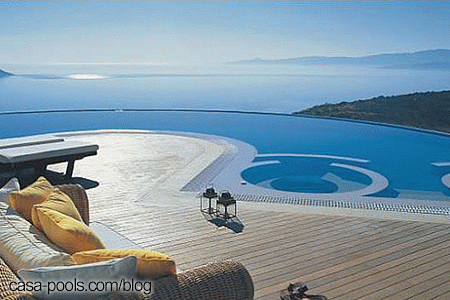|
|
|
Published On: February 25, 2014
By: Joseph Jackson, South Carolina
|
HEALTH CATEGORY
|
SWIM WITHOUT THE CHEMICALS
|

|
|
swim without the chemicals
|
As summer approaches and the temperature starts to soar, our thoughts can lead to one thing…
Swimming.
If you don’t live close enough to a gorgeously sparkling lake or ocean, a pool is one way to keep cool. Whether it’s your own, a friend’s or a community pool, read on to find out how to keep your family protected from those nasty pool chemicals.
Swimming in chlorinated pool water, and particularly the disinfection byproducts caused by the reaction of the chlorine with our skin and hair, can cause numerous health problems. These include hormone disruption, asthma and allergies, and intestinal issues. Holistic Squid shares healthy, safe swimming tips to stave off these effects and put your parental mind at ease.
Swim outdoors, rather than at an indoor facility. This helps to ventilate the chlorine and lessen the effects of the chemicals on little bodies. Better yet, try to find an outdoor pool that uses salt water, UV, or ionization, which all use far less chlorine and chemicals for maintenance.
Rinse off before diving in. We all remember whining as children, “do I really have to do that?!” But rinsing off not only helps to fight off the chemicals which may seep into our skin and hair, but washes off sweat, which, when mixed with chlorine, can create a dangerous chemical compound called chloramine.
Slather on some coconut oil and spritz some Vitamin C. As further protection, Holistic Squid suggests applying coconut oil before swimming to preserve your skin’s natural pH balance and protect further against chemical seepage, and even provide mild protection against the sun’s rays in the water.
When everyone’s done doggie-paddling, spritz on some Vitamin C, which neutralizes the effects of chlorine and chloramine. You can purchase a topical spray for this purpose or make your own by dissolving 1 teaspoon of powdered Vitamin C with 2 cups filtered water — just put it in a cheap spray bottle and you’re all set!
There are even some great ways to enjoy summer in your own cement pond… all while putting your own eco-friendly mind at ease. Becky Flanagan from In the Swim has several ideas for maintaining your pool while reducing the need of harmful chemicals.
Try ultraviolet pool cleaners. These products won’t completely replace the need for chlorine or other chemicals, but they can help cut down on the amount of these products you’ll need to use. Relatively new to the U.S., these cleaners harness ultraviolet light to lower chemical levels and eliminate chlorine byproducts.
Create a saltwater pool. Here, salt is added to the pool water and a chlorine generator uses that salt to create chlorine naturally. The system works to reduce the levels of microorganisms to safe levels, and some products also can oxidize (and essentially burn up) organic contaminants like body oil, perspiration, urine, and sunscreen. Salt water isn’t able to provide sanitation for pool water, however, without electrolysis, which uses the chlorine generator to provide the sanitation component.
Implement an ozone pool system. Like the ultraviolet system, this still needs to use chlorine for sanitation, but in lesser amounts. The ozone is generated through a type of ultraviolet light. Jets or circulation systems mix the ozone in with pool water. The ozone then breaks down in the pool water and destroys unwanted contaminants in the water.
How about a natural plant pool? These natural pools are a beautiful oasis of greenery and very sustainable, as well as safe and enjoyable places to swim. Many times, a natural plant pool is lined with rubber or reinforced polyethylene with a separate area nearby which has been planted with aquatic vegetation, acting as a biological filter. These systems have lower maintenance costs, and the installation costs are not much greater than standard designs.
By taking precautions to protect yourself and your family, you’ll be able to cool off and enjoy the water with peace of mind. And isn’t fun and relaxation what summer’s all about?
|
|
|
|
|
